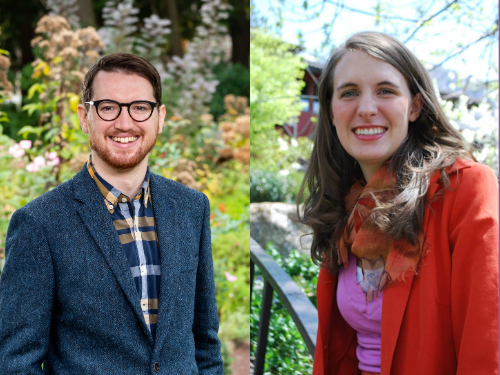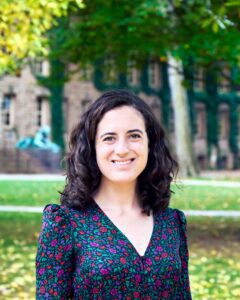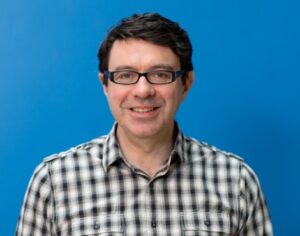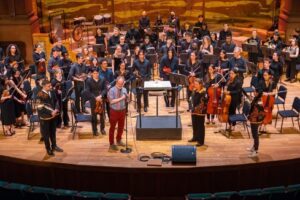The Department of Music congratulates Musicology students Christopher Parton and Hannah McLaughlin, who were among the 10 winners of this year’s Graduate School Teaching Award in recognition of outstanding undergraduate teaching.
Chris Parton (G7) received the award for his freshman Writing Seminar, Sound and the City: inspired by his experience living within the silence of COVID-lockdown Germany, the course encouraged students to tune in to the sounds around them — the noises and the silence — and to consider what these varied soundscapes might reveal about ourselves and society.
Each semester, the Writing Seminar Program offers graduate student recipients of the Quin Morton Teaching Fellowship like Parton the unique opportunity to develop and teach a course entirely on their own. Over the course of the semester, instructors guide on average 12 first-year undergraduate students through a series of three extended writing assignments aimed at developing their unique voices as writers.
In Sound and the City, assignments covered such topics as noise pollution and abatement in the noisy metropolis of New York City and the weaponization of noise codes by white neighbors in gentrified areas, among other topics.
“Writing transforms how we perceive the world; it challenges us to express ourselves in a way that is beyond ‘I like this’ or ‘I don’t like this.’”
Students in Parton’s seminar comprised a number of musicians and also a strong contingent of first-years who simply found music and sound intriguing. His semester’s work was to equip musician and non-musician student alike with the vocabulary to engage in scholarly discourse around the ubiquitous power of sound.
“I especially enjoy teaching non-musician students because you can really open up for them a whole world way of experiencing the world.”
Today, Parton is doing something he’s never done before — teaching a course for a second time. With a brand new group of students, whom he calls his “apprentice scholars,” texts he’s read a hundred times are surprising him anew.
“I’m constantly surprised by new insights and new perspectives that the students bring.”
Our department’s other celebrated awardee is musicologist Hannah McLaughlin (G5), who has been recognized for her precepting of Professor Simon Morrison’s popular Music of the Romantic Era course. McLaughlin had precepted the course during COVID, but teaching it in person was a new experience — in fact, it was her first ever time precepting in person at Princeton!
McLaughlin, who has a background in music education and taught junior high school choir prior to coming to Princeton, found particular joy in indulging her philosophy about group listening and shared discourse among such a vibrant and varied group of students.
“As a junior high school choir teacher, the biggest piece of advice that I got was to let the music do the talking. But at some point, we feel compelled to talk about it! One of my primary goals is to teach the students how to talk about this thing that is literally impossible to talk about. It’s a fun challenge.”
Morrison would devote lecture periods to towering works of the era (think: Beethoven symphonies), leaving McLaughlin the good fortune of delving into other gems (think: Beethoven’s song cycle An die ferne Geliebte). Through group listening exercises — something McLaughlin dares not take for granted now that we know what it’s like to not be able to meet as a group and listen together — she and her 12 students meandered through the long nineteenth century’s musical footprint, exploring how these many musical works provide insight into the values and cultural aspects of the period.
Conversations among the precept’s 12 students — some music majors, others students who either had encountered Morrison through the Slavic Department or who simply loved Romantic Era music — wove in and out of topics like death, the macabre, the unknown, exotic lands, gender, and more.
“It’s really cool to see the students make connections while listening to a piece of music — like how a move from the tonic key to the submediant might imply a move into a dream world and what that might tell us about society at the time.”
As was the case in Parton’s Writing Seminar, the complex discourse in McLaughlin’s precept at times necessitated a bit of heavy lifting: building the vocabulary to discuss the music was critical to enabling productive conversations.
“Besides, it’s always nice when you can add a vocabulary word to something that students already recognize or hear. It enables them to engage in these conversations with confidence.”
But from time to time, McLaughlin would abandon material she’d planned for the day in response to some greater need from the students — to perform a close-read of a particularly challenging text, perhaps, or to wander off along the path of some enriching tangent, sparked by a comment from a student who’d recognized, say, Wagner’s name from a text he’d read about Nietzsche.
“It’s great to see the students taking what they’ve learned and applying it to another context, which means they’ve internalized the concept.”
Speaking with Parton and McLaughlin in the days following the Teaching Award announcement, both independently emphasized the myriad opportunities that have enabled their success as educators. They touted the mentorship they’ve received along the way through the Music Department, and Parton also referenced such welcome professional development resources as provided by the McGraw Center and the Writing Center. A formative experience for both Parton and McLaughlin was working with the University’s Prison Teaching Initiative, a program that provides accredited college courses to incarcerated individuals in New Jersey’s prisons. Both spoke passionately of the many challenges and also the many, many joys that come with teaching in a prison setting, connecting the experience to their success as educators today.
“Teaching in PTI was a formidable growing experience. I’m aching to participate in the program again.” — McLaughlin
Looking ahead, both Parton and McLaughlin have exciting next steps to look forward to. McLaughlin, who hopes to defend her dissertation next year, aims to begin applying for teaching and professorial positions. She loves working with young people and finds particular joy in giving them a chance to listen to classical music perhaps for the first time, so teaching young people might be in the cards. She is also keen to continue one of her favorite classroom traditions — a group listening exercise in which the class listens together to a full symphony, from start to finish, an exercise which has become harder and harder in our modern society. She also aspires to write textbooks and curricula.
As for Parton, next year he will leave the nest of the Music Department to begin his new path as a lecturer in the Writing Program, a program that has so profoundly influenced his own work as an educator. He hopes to continue offering Sound and the City to future generations of Princetonians.
We congratulate both Chris and Hannah and look forward to championing their every endeavor!
In Other News

What Actually Happens At An Academic Music Conference?
Feb 1, 2024
Every November, thousands of music theorists and musicologists descend upon the vast ballrooms of America’s metropolitan convention hotels for their annual academic society meeting. This past November, the American Musicological Society (AMS), which celebrates its ninetieth annual meeting in 2024, and Society for Music Theory (SMT) held their joint conference in the Mile-High City of Denver, Colorado.
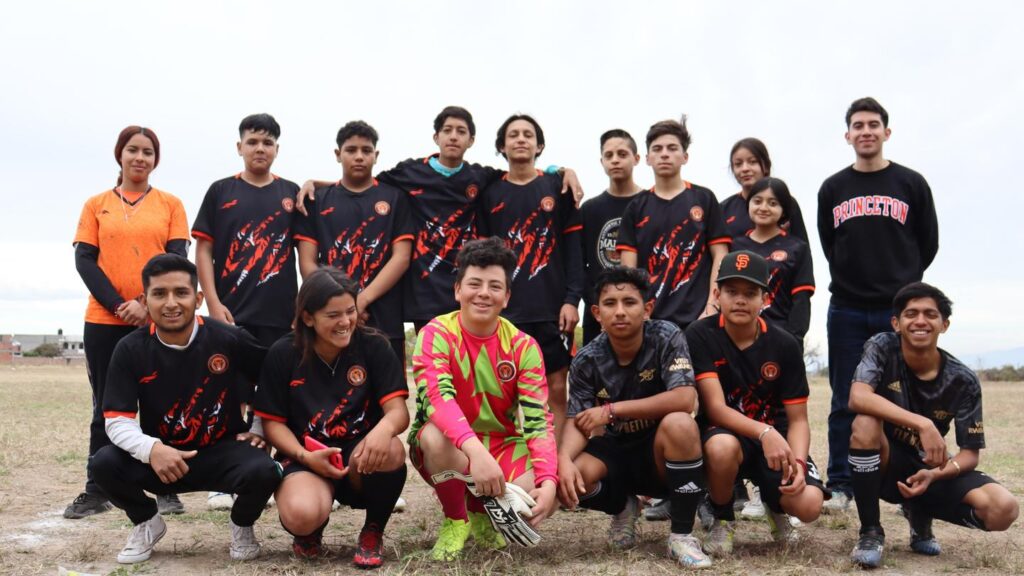
It takes a village: Projects for Peace winner Carlos Cortez ’24 and the people of Zináparo bring music and soccer to their youth
Jan 23, 2024
It takes a village: Projects for Peace winner Carlos Cortez ’24 and the people of Zináparo bring music and soccer to their youth
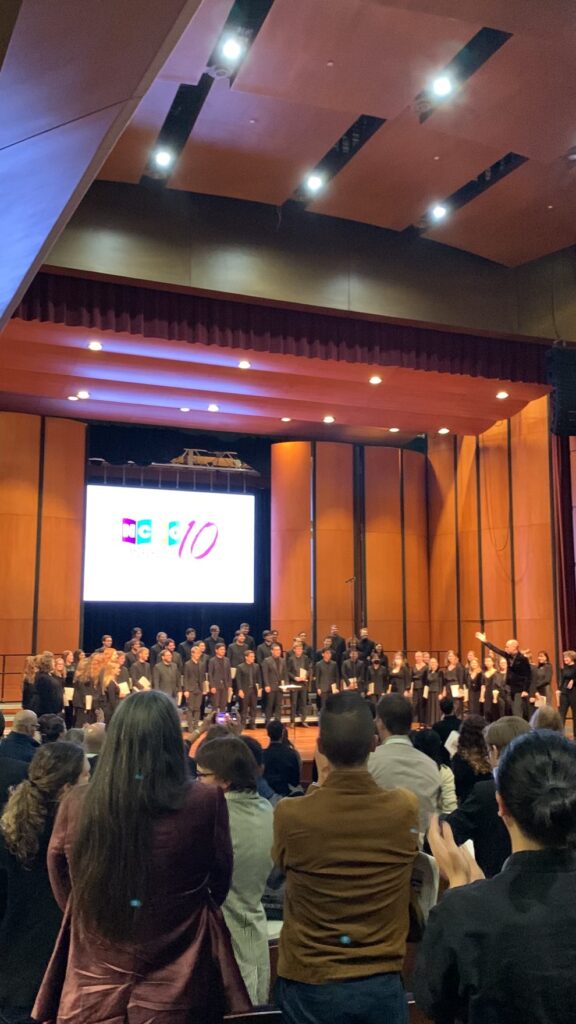
Princeton University Chamber Choir and Alumni Perform at National Collegiate Choral Organization Biennial
Dec 12, 2023
The Princeton University Chamber Choir, joined by twenty-five alumni, recently made their mark at the National Collegiate Choral Organization (NCCO) biennial conference.

